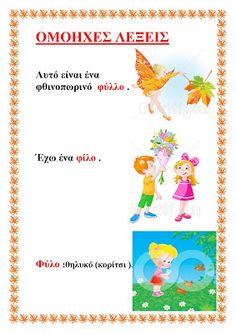Difference between revisions of "Language/Modern-greek-1453/Grammar/Homonyms-and-homophones"
< Language | Modern-greek-1453 | Grammar
Jump to navigation
Jump to search
m (Quick edit) |
|||
| (8 intermediate revisions by 3 users not shown) | |||
| Line 1: | Line 1: | ||
{{Modern-greek-1453-Page-Top}} | |||
[[File:ab93958008cd25cbec55a8b616e72320.jpg|thumb | [[File:ab93958008cd25cbec55a8b616e72320.jpg|thumb]] | ||
<div class="pg_page_title">Homonyms VS Homophones</div> | |||
* Some words are pronounced or written in the same way, but do not have the same meaning: they are '''homonyms'''. | |||
* '''Homophones''' are homonyms that sound the same but have different spellings. | |||
<span link>Finish this lesson and explore these related pages:</span> [[Language/Modern-greek-1453/Grammar/Verb-To-Be|Verb To Be]], [[Language/Modern-greek-1453/Grammar/The-predicate|The predicate]], [[Language/Modern-greek-1453/Grammar/The-combinations-«αυ»-and-«ευ»|The combinations «αυ» and «ευ»]] & [[Language/Modern-greek-1453/Grammar/Punctuation|Punctuation]]. | |||
| | == Examples == | ||
|- | |||
| | |||
{| class="wikitable" | {| class="wikitable" | ||
|'''Κλείνω''' την πόρτα / I close the door | |||
|'''κλίνω''' ένα ρήμα / Conjugate a verb | |||
|- | |- | ||
|'''Ο τοίχος''' | |'''Ο τοίχος''' του σπιτιού / The wall of the house | ||
|'''το τείχος''' | |'''το τείχος''' της πόλης / The city wall | ||
|- | |- | ||
|'''Σήκω''' (πρόσταγμα) / | |'''Σήκω''' (πρόσταγμα) / get up (command) | ||
|'''σύκο''' ( | |'''σύκο''' (the fruit of the fig tree) | ||
|- | |- | ||
|'''Χίλια''' (αριθμητικό) / | |'''Χίλια''' (αριθμητικό) / (thousand the number) | ||
|''' | |'''Χείλη''' / the lips | ||
|- | |- | ||
|'''Το κλίμα''' | |'''Το κλίμα''' της Ελλάδας / Climate of Greece | ||
|'''το κλήμα''' | |'''το κλήμα''' της αυλής μας / The vine of the our courtyard | ||
|- | |- | ||
|'''Χήρος''' (ο άντρας) / | |'''Χήρος''' (ο άντρας) / widower (the man) | ||
|'''ο χοίρος''' (το γουρούνι) / | |'''ο χοίρος''' (το γουρούνι) / the pig | ||
|- | |- | ||
|'''Γάλλος''' (από τη Γαλλία) / | |'''Γάλλος''' (από τη Γαλλία) / French (from France) | ||
|'''γάλος''' | |'''γάλος''' / the turkey, | ||
|- | |- | ||
|'''Το φιλί /''' | |'''Το φιλί /''' the kiss | ||
|'''η φυλή'''( η ράτσα) / | |'''η φυλή'''( η ράτσα) / the race | ||
|- | |- | ||
|'''Μίλα''' (από το ρήμα μιλώ) / | |'''Μίλα''' (από το ρήμα μιλώ) / speak | ||
|'''μήλα''' | |'''μήλα''' / apples | ||
|- | |- | ||
|'''κόμμα''' | |'''κόμμα''' (σημείο στίξης και πολιτικό) / comma, political party | ||
|'''το κώμα''' | |'''το κώμα''' : coma, unconscious state | ||
|} | |} | ||
{{Marianthi-Signature}} | |||
==Other Lessons== | |||
* [[Language/Modern-greek-1453/Grammar/Moods|Moods]] | |||
* [[Language/Modern-greek-1453/Grammar/Particularities-of:-Πώς,-πως,-πού,-που,-ή,-η|Particularities of: Πώς, πως, πού, που, ή, η]] | |||
* [[Language/Modern-greek-1453/Grammar/The-degrees-of-the-adjective|The degrees of the adjective]] | |||
* [[Language/Modern-greek-1453/Grammar/Participle-spelling|Participle spelling]] | |||
* [[Language/Modern-greek-1453/Grammar/Verbes-auxiliaires|Verbes auxiliaires]] | |||
* [[Language/Modern-greek-1453/Grammar/Pronoms-interrogatifs|Pronoms interrogatifs]] | |||
* [[Language/Modern-greek-1453/Grammar/Basic-spelling-rules|Basic spelling rules]] | |||
* [[Language/Modern-greek-1453/Grammar/Personal-pronouns|Personal pronouns]] | |||
* [[Language/Modern-greek-1453/Grammar/Synonyms-Antonyms|Synonyms Antonyms]] | |||
* [[Language/Modern-greek-1453/Grammar/Imperative-Mood-in-Greek|Imperative Mood in Greek]] | |||
<span links></span> | |||
Latest revision as of 23:13, 26 March 2023
Homonyms VS Homophones
- Some words are pronounced or written in the same way, but do not have the same meaning: they are homonyms.
- Homophones are homonyms that sound the same but have different spellings.
Finish this lesson and explore these related pages: Verb To Be, The predicate, The combinations «αυ» and «ευ» & Punctuation.
Examples[edit | edit source]
| Κλείνω την πόρτα / I close the door | κλίνω ένα ρήμα / Conjugate a verb |
| Ο τοίχος του σπιτιού / The wall of the house | το τείχος της πόλης / The city wall |
| Σήκω (πρόσταγμα) / get up (command) | σύκο (the fruit of the fig tree) |
| Χίλια (αριθμητικό) / (thousand the number) | Χείλη / the lips |
| Το κλίμα της Ελλάδας / Climate of Greece | το κλήμα της αυλής μας / The vine of the our courtyard |
| Χήρος (ο άντρας) / widower (the man) | ο χοίρος (το γουρούνι) / the pig |
| Γάλλος (από τη Γαλλία) / French (from France) | γάλος / the turkey, |
| Το φιλί / the kiss | η φυλή( η ράτσα) / the race |
| Μίλα (από το ρήμα μιλώ) / speak | μήλα / apples |
| κόμμα (σημείο στίξης και πολιτικό) / comma, political party | το κώμα : coma, unconscious state |
Author[edit source]
- Ευγενική χορηγία που στοχεύει να βοηθήσει μαθητές ή μη, απανταχού της Γης, που επιδίδονται στην εκμάθηση της ελληνικής γλώσσας!
- Contribution bénévole visant à aider les personnes, partout dans le monde, qui sont engagées dans l'apprentissage de la langue grecque !
- Voluntary contribution aimed at helping people, all over the world, who are committed to learning the Greek language!
Other Lessons[edit | edit source]
- Moods
- Particularities of: Πώς, πως, πού, που, ή, η
- The degrees of the adjective
- Participle spelling
- Verbes auxiliaires
- Pronoms interrogatifs
- Basic spelling rules
- Personal pronouns
- Synonyms Antonyms
- Imperative Mood in Greek

